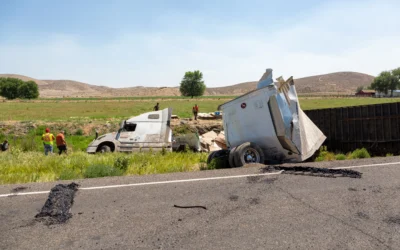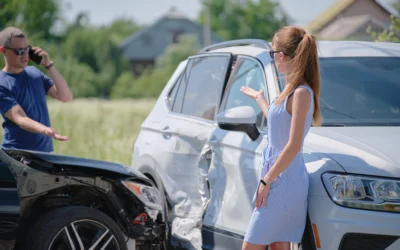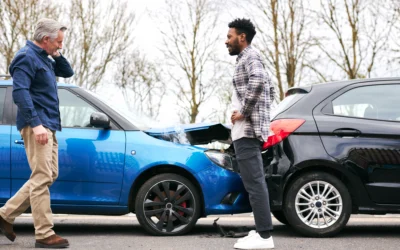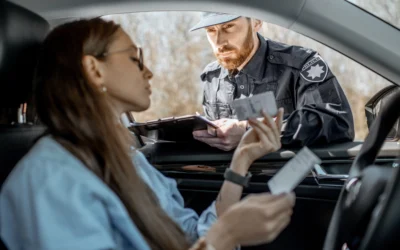When Your Dream Road Trip Becomes a Legal Nightmare
Nevada’s scenic highways attract RV travelers year-round—families towing trailers, retirees cruising in motorhomes, and adventurers exploring the desert. But when a vacation on wheels ends in a crash, the consequences can be serious. The sheer size of RVs, paired with Nevada’s terrain, weather, and RV-specific regulations, can turn a simple accident into a complicated legal and financial situation.
What Makes RV Accidents Different from Regular Car Crashes?
Recreational vehicle accidents present unique challenges that separate them from typical passenger car collisions. The sheer size and weight differences create devastating outcomes, while Nevada’s specific laws governing these vehicles add layers of complexity most drivers never consider.
Size and Weight Factors
A typical Class A motorhome can weigh up to 30,000 pounds when fully loaded, compared to a standard passenger car weighing around 3,000 pounds. This ten-fold difference in mass creates dramatically different physics during collisions. When a fully loaded RV strikes a sedan, the results are often catastrophic for the smaller vehicle’s occupants.
Stopping Distance Challenges
RVs require significantly longer stopping distances than regular vehicles. A motorhome traveling at 65 mph on I-15 needs approximately 300 feet to come to a complete stop under ideal conditions. Add Nevada’s mountainous terrain, sudden weather changes, or worn brakes, and this distance increases dramatically. Many RV accidents occur because drivers underestimate these stopping requirements.
Handling and Maneuverability Issues
Recreational vehicles handle differently than standard cars, especially in crosswinds common along Nevada’s open highways. The high profile of RVs makes them susceptible to sudden gusts, particularly dangerous when traveling through areas like Winnemucca or along Highway 50, Nevada’s “Loneliest Road.”
Nevada’s Legal Framework for RV Accidents
Nevada treats recreational vehicles under specific statutory provisions that differ from standard automobile regulations. Understanding these laws becomes important when determining liability and insurance coverage after an accident.
Motor Vehicle vs. Trailer Classifications
Nevada law distinguishes between motorized RVs (like motorhomes) and towable RVs (like travel trailers and fifth wheels). If you drive a motorhome, RV liability coverage is required by Nevada law and must meet the state’s minimum insurance requirements. However, if your RV is a non-motorized towable, such as a fifth wheel or a travel trailer, you are not required by Nevada state law to have RV insurance.
This distinction becomes critical in accident scenarios. Motorhomes must carry Nevada’s minimum liability coverage of $25,000 per person for bodily injury, $50,000 per accident for bodily injury, and $20,000 for property damage. Towable RVs typically fall under the towing vehicle’s insurance policy, though coverage gaps can occur.
Registration and Titling Requirements
In Nevada trailers are separately titled and registered with the Department of Motor Vehicles. This separate registration requirement means towable RVs have their own legal identity, which can complicate liability determinations when accidents occur.
Common Causes of RV Accidents in Nevada
Nevada’s diverse terrain and weather patterns create specific hazards for recreational vehicle operators. From the steep grades of Mount Charleston to the straight stretches of I-80 across the desert, each area presents unique challenges.
Driver Inexperience and Overconfidence
Many RV accidents stem from drivers underestimating the complexity of operating these large vehicles. Weekend warriors who rent motorhomes for vacation often lack experience handling vehicles that may be three times longer and ten times heavier than their daily drivers. This inexperience becomes dangerous on Nevada’s highways, where sudden stops or evasive maneuvers can lead to jackknifing or rollovers.
Mechanical Failures and Maintenance Issues
The harsh Nevada climate takes a toll on recreational vehicles. Extreme heat can cause tire blowouts, brake failures, and engine overheating. Many RV owners fail to perform adequate pre-trip inspections or maintain their vehicles properly between seasonal uses. Brake failures are particularly dangerous given the long downhill grades found throughout Nevada’s mountainous regions.
Weather-Related Incidents
Nevada’s weather can change rapidly, especially in mountainous areas. Sudden thunderstorms, high winds, and flash floods create hazardous conditions for RV operators. The high profile of recreational vehicles makes them particularly susceptible to crosswinds, which can be severe in open desert areas and mountain passes.
Improper Loading and Weight Distribution
Overloading RVs or improperly distributing weight affects handling and braking. Many accidents occur when improperly loaded RVs become unstable during turns or emergency maneuvers. Nevada’s weigh stations monitor commercial vehicles but recreational vehicle overloading often goes undetected until an accident occurs.
How Do I Report an RV Accident in Nevada?
Nevada’s accident reporting requirements apply equally to recreational vehicles and standard automobiles. Understanding these requirements can protect your legal interests and ensure compliance with state law.
Immediate Scene Requirements
Nevada Revised Statutes Section 484E.010 requires drivers involved in crashes resulting in injury or death to immediately stop at the scene. The driver of any vehicle involved in a crash on a highway or on premises to which the public has access resulting in bodily injury to or the death of a person shall immediately stop his or her vehicle at the scene of the crash.
For property damage only accidents, drivers must exchange information including names, addresses, registration numbers, and insurance information. If the RV is creating a traffic hazard and can be moved safely, Nevada law requires moving it out of traffic lanes.
Reporting Timeframes and Requirements
The driver of a vehicle which is in any manner involved in a crash on a highway or on premises to which the public has access, if the crash results in bodily injury to or the death of any person or total damage to any vehicle or item of property to an apparent extent of $750 or more, shall, within 10 days after the crash, forward a written or electronic report of the crash to the Department.
Given the size and value of most recreational vehicles, the $750 threshold is almost always exceeded in RV accidents. The 10-day reporting requirement applies unless police officers are handling the reporting process.
Special Considerations for Out-of-State RV Owners
Many RV accidents in Nevada involve out-of-state residents. These visitors must still comply with Nevada’s reporting requirements regardless of their home state laws. Failure to report can result in driving privilege suspension in Nevada, which can affect driving privileges in your home state through interstate compacts.
What Insurance Coverage Do I Need for My RV in Nevada?
Insurance requirements for recreational vehicles in Nevada depend on the type of RV and how it’s used. The complexity of RV insurance often surprises owners when accidents occur.
Motorhome Insurance Requirements
Motorized RVs must carry Nevada’s minimum liability insurance. However, these minimums may be inadequate given the potential for severe damage these large vehicles can cause. A serious RV accident can easily result in damages exceeding the state minimums, leaving owners personally liable for the excess.
Comprehensive coverage becomes particularly important for RVs given their high value and susceptibility to weather damage, theft, and vandalism. Many RV owners make the mistake of treating their recreational vehicle insurance like standard auto coverage, only to discover gaps when claims occur.
Towable RV Coverage Complexities
There are no special insurance requirements for trailers in Nevada. However, if you are planning on towing one, it is in your best interests to confirm that your auto insurance company will cover any damage it can potentially cause.
This lack of specific requirements creates potential coverage gaps. Your towing vehicle’s liability coverage may extend to a trailer, but physical damage coverage often requires separate trailer insurance or specific endorsements. Many drivers discover these gaps only after accidents occur.
Full-Timer vs. Recreational Use Coverage
RV insurance policies distinguish between recreational use and full-time residence. Full-timers need additional coverage for personal property, liability while parked, and loss of use expenses. Nevada sees many full-time RV residents, particularly in the Las Vegas area, making this distinction crucial for proper coverage.
Determining Fault in Nevada RV Accidents
Nevada follows a fault-based system for motor vehicle accidents, meaning the at-fault party’s insurance typically pays for damages. However, determining fault in RV accidents can be complex due to multiple contributing factors.
Comparative Negligence in Nevada
Nevada uses a modified comparative negligence system. If you’re partially at fault for an accident, your recovery is reduced by your percentage of fault, provided your fault doesn’t exceed 50%. This system becomes particularly relevant in RV accidents where multiple factors often contribute to crashes.
For example, if an RV driver fails to yield but the other driver was speeding, both parties may share fault. The RV driver might be 70% at fault for the failure to yield, while the other driver might be 30% at fault for speeding. The speeding driver could still recover damages, reduced by their 30% fault.
Special Liability Considerations for RV Operators
RV operators may face heightened liability standards due to the increased danger these large vehicles pose. Courts sometimes apply a higher duty of care to operators of oversized vehicles, meaning actions that might be considered normal driving in a passenger car could constitute negligence when operating an RV.
Mechanical Failure and Maintenance Liability
Poor maintenance can establish negligence in RV accidents. If brake failure causes an accident and investigation reveals the owner failed to maintain the braking system properly, this neglect can establish fault. Given the complex mechanical systems in modern RVs, maintenance records become crucial evidence in accident cases.
Common Injuries in RV Accidents
The size disparity between RVs and passenger vehicles often results in severe injuries. Understanding these injury patterns helps victims and their families prepare for the legal and medical challenges ahead.
Traumatic Brain Injuries and Spinal Cord Damage
High-impact RV collisions frequently cause traumatic brain injuries and spinal cord damage. These catastrophic injuries require extensive medical treatment and often result in permanent disability. The costs associated with these injuries can quickly exceed insurance policy limits, making adequate coverage crucial.
Multiple Trauma and Complex Fractures
RV accidents often involve multiple trauma due to the violent forces involved. Victims may suffer multiple broken bones, internal injuries, and soft tissue damage requiring multiple surgeries and extended rehabilitation. These complex injury patterns make case valuation challenging and require experienced legal representation.
Psychological Trauma and PTSD
The traumatic nature of RV accidents often causes lasting psychological effects. Victims may develop post-traumatic stress disorder, anxiety, or depression following severe accidents. Nevada law recognizes these psychological injuries as compensable damages when properly documented and treated.
What Should I Do If I’m in an RV Accident?
Taking proper steps immediately after an RV accident can protect your health, legal rights, and financial interests. The unique aspects of RV accidents require specific considerations beyond standard accident protocols.
Immediate Safety and Medical Priorities
First priority is always safety and medical care. RV accidents often involve fires due to propane systems or electrical issues. If your RV is smoking or you smell gas, evacuate immediately and move to a safe distance. Call 911 even if injuries seem minor, as adrenaline can mask serious trauma.
Large RVs create traffic hazards even when stopped safely. Use emergency triangles or flares to warn approaching traffic, placing them at least 100 feet behind your RV on highways. The size of RVs makes them difficult for approaching drivers to see around, creating secondary accident risks.
Evidence Preservation and Documentation
Document everything possible at the scene. Take photos of all vehicles, the accident scene, road conditions, and any traffic control devices. RV accidents often involve claims of mechanical failure, making detailed photos of tire marks, debris patterns, and vehicle positions crucial evidence.
Get contact information from all parties involved and any witnesses. In tourist areas, witnesses may be from out of state and difficult to locate later. Exchange insurance information, but avoid discussing fault or making statements about what happened beyond basic facts required by law.
Dealing with Insurance Companies
Contact your insurance company promptly, but be careful about recorded statements until you’ve consulted with an attorney. Insurance adjusters often contact accident victims quickly after RV accidents, knowing that unfamiliarity with the claims process and stress from injuries makes people more likely to accept inadequate settlements.
RV damage assessment requires adjusters familiar with these complex vehicles. Standard auto adjusters may not properly evaluate RV damage, leading to inadequate repair estimates. Insist on adjusters with RV experience and get independent estimates when dealing with significant damage.
Special Considerations for Out-of-State Visitors
Nevada’s status as a major tourist destination means many RV accidents involve out-of-state residents unfamiliar with local laws and conditions. These cases present unique challenges requiring careful attention to jurisdictional and procedural issues.
Jurisdictional Issues and Choice of Law
When out-of-state residents are involved in Nevada RV accidents, questions arise about which state’s laws apply to various aspects of the case. Generally, Nevada law governs the accident itself, but issues like insurance coverage and damage calculations may involve the law of other states.
If you’re injured in a Nevada RV accident and return to your home state for treatment, you may need to coordinate legal proceedings between jurisdictions. This complexity makes experienced local representation essential for protecting your interests.
Interstate Insurance Complications
Out-of-state RV owners may have insurance policies written in other states with different coverage requirements and exclusions. These policies must still provide Nevada’s minimum coverage when operating in Nevada, but policy interpretations can become complex when multiple states’ laws are involved.
Some insurance companies delay claim processing when accidents occur outside the policy holder’s home state, hoping distance and inconvenience will pressure quick settlements. Don’t let geographic distance weaken your claim.
Commercial RV Operations and Liability
The growing popularity of RV rentals and tour operations creates additional liability layers when accidents involve commercial operators. These cases often involve higher insurance limits but also more complex liability theories.
Rental Company Liability
RV rental companies may face liability for accidents involving their vehicles under various theories. If they rent vehicles with known mechanical defects or to unqualified drivers, they can be held responsible for resulting accidents. Nevada requires rental companies to maintain higher insurance limits than private owners.
Rental agreements often contain liability limitations and arbitration clauses that can complicate accident claims. These provisions may not be enforceable if they violate Nevada public policy or if the rental company’s negligence contributed to the accident.
Tour Operator Responsibilities
Guided RV tours have become popular in Nevada, with companies offering everything from luxury motorcoach tours to adventure camping expeditions. These operators owe their customers a high duty of care and may be liable for accidents caused by unsafe routes, inadequate driver training, or mechanical neglect.
Commercial operators must comply with federal motor carrier safety regulations in addition to Nevada state laws. Violations of these regulations can establish negligence and increase liability exposure.
Key Takeaways
- RV accidents in Nevada involve unique legal complexities due to vehicle size, registration requirements, and insurance regulations that differ from standard automobile law
- Nevada requires motorhomes to carry liability insurance meeting state minimums, but towable RVs have no specific insurance requirements, creating potential coverage gaps
- Accident reporting requirements apply to all RV accidents causing injury, death, or property damage exceeding $750, with reports due within 10 days
- Nevada’s comparative negligence system allows partial recovery even when you share fault, provided your fault doesn’t exceed 50%
- RV operators may face heightened liability standards due to the increased danger these large vehicles pose to other road users
- Proper maintenance documentation becomes crucial evidence in RV accident cases, as mechanical failures can establish negligence
- Out-of-state RV owners must still comply with Nevada reporting requirements and may face complex jurisdictional issues in accident claims
Frequently Asked Questions About RV Accidents in Nevada
Do I need special insurance for my travel trailer in Nevada?
Nevada doesn’t require specific insurance for towable RVs like travel trailers, but your towing vehicle’s insurance may not provide adequate coverage. You should verify that your auto policy covers trailer liability and consider separate trailer insurance for physical damage coverage.
What happens if my RV rental is involved in an accident?
Rental RV accidents can involve both your personal insurance and the rental company’s coverage. The rental company should provide primary liability coverage, but you may be responsible for deductibles and damage not covered by their policy. Always purchase rental company insurance and verify your personal policy’s rental coverage.
How long do I have to file a lawsuit after an RV accident in Nevada?
Nevada’s statute of limitations for personal injury claims is two years from the date of the accident. Property damage claims have a three-year limit. However, the complexity of RV accidents means you should consult with an attorney well before these deadlines to ensure proper case development.
Can I be held liable if my RV causes an accident while parked?
Yes, parked RVs can create liability if they’re positioned unsafely or create traffic hazards. You’re required to properly secure your RV and comply with parking regulations. If your parked RV contributes to an accident due to improper positioning or inadequate warning devices, you may face liability.
What if the other driver claims my RV’s size made the accident unavoidable?
Vehicle size alone doesn’t establish fault, but RV operators do have heightened responsibilities due to their vehicles’ impact potential. If you were following traffic laws and operating safely, the other driver’s inability to avoid your RV doesn’t automatically make you liable. However, courts may examine whether you provided adequate warning or took proper precautions given your vehicle’s size.
How is fault determined when an RV accident involves mechanical failure?
Mechanical failure doesn’t automatically excuse liability. Courts examine whether proper maintenance was performed and if the failure was foreseeable. Well-documented maintenance records can protect you from liability, while neglected maintenance can establish negligence even when mechanical failure contributed to the accident.
Do Nevada’s DUI laws apply differently to RV operators?
Nevada’s DUI laws apply equally to all motor vehicles, including RVs. However, RV DUI cases can be more complex because RVs often contain living areas with alcohol. If you’re arrested for DUI in an RV, police may search both the driving area and living quarters, potentially finding additional evidence.
What compensation can I recover after a serious RV accident?
Nevada allows recovery for medical expenses, lost wages, pain and suffering, property damage, and other economic losses. In cases involving permanent disability or death, damages can include future medical care, lost earning capacity, and loss of life’s enjoyment. Punitive damages may be available if the at-fault party’s conduct was particularly reckless.
Contact Joey Gilbert Law for Your RV Accident Case
RV accidents in Nevada present complex legal challenges that require experienced representation familiar with both state law and the unique aspects of recreational vehicle litigation. Don’t let insurance companies minimize your claim or accept inadequate settlements that fail to cover your full damages.
At Joey Gilbert Law, we understand the devastating impact RV accidents can have on victims and their families. Our team has extensive experience handling complex motor vehicle cases involving large recreational vehicles, commercial operations, and out-of-state parties. We know how to investigate these cases thoroughly, work with appropriate technical authorities, and fight for full compensation.
If you or a loved one has been injured in an RV accident in Nevada, time is crucial for preserving evidence and protecting your rights. Contact us today for a free consultation to discuss your case and learn how we can help you get the compensation you deserve. We work on a contingency fee basis, meaning you pay nothing unless we recover compensation for you.
Don’t face the insurance companies alone. Let our experience work for you during this difficult time.




